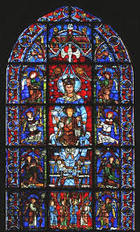
I don’t know what your favourite biblical picture of God is, but Hosea’s image of the compassionate, wrestling, parent is one of mine. It is so far, isn’t it, from many ideas of God?! On the one hand, for example, some ideas of God are so philosophical, intellectual, abstract or distant from us, that they are really no help at all. On the other hand, other common ideas of God are so trivial, moralistic, or intellectually ridiculous that they do not stand up to the rigours and ambiguities of our human experience: our questions, our complex lives, and, above all, our sufferings and deepest longings. The mystery of our lives simply does not fit, for instance, into narrowed, moralistic ideas of God. Rather, as Hosea shows us in today’s reading (chapter 11, verses 1-11), God is far greater mystery than our own mysterious lives. In God, says the book of Hosea we find the most profound love of all: a love which, like a parent’s love, is full of continual compassion as well as command, mercy as well as morality. Whereas some stress justice and punishment in God, Hosea shows us that God is ultimately, and always, a father-mother, who can never give up their child. For God loves us with such intimate love, and leads us, as Hosea says, ‘with cords of human kindness, with bands of love’ that even when we turn away we can never be lost to such compassion. How wonderful then that we have a baptism this morning, to help us embody this compassion of God! For our Hosea reading not only offers us a model of compassionate parenthood for us to emulate, but it reminds us that each of us is eternally loved and longed for by God, whatever the hurts we inflict or the hopes we fulfil. May we who greet Margaret Rose in baptism therefore be strengthened to know this truth in our lives and in our own wrestlings with hurt and hope.
If we want a later, New Testament, passage to go with Hosea’s amazing image of God’s compassion then we might also fruitfully reflect further on Jesus’s story of the Prodigal Son and the Compassionate Father. Remember how the son in that story betrays his father’s hopes and wastes his life? Remember how he returns in desperation, shame and remorse to his father, only to find his father running at full steam to great him and welcome him home with indescribable joy and feasting? This is a similar image to Hosea: an image of the biblical God who is simply not contained by our ordinary ideas of justice and behaviour. For whilst judgement, punishment and even aspects of awful violence are to be found in the Bible, they cannot triumph. Such terrible ideas of God are part of human and divine wrestling with truth and justice. Ultimately however, as we see in today’s reading from Hosea, compassion, forgiveness and mercy prevail. For these are the real heart and nature of God.
Let me offer one more picture of God from our Christian tradition to go with those two great Jewish biblical pictures of which I have spoken. This picture is the great image of mother and child: like that in the east end window of this church building which oversees almost all of what we are and do in this place. It calls us into constant reflection, and rest of mind and soul. For in the mother we see the same kind of love of which Hosea and Jesus in his parable spoke. It is a love which holds both the hope she has for her child and also the child’s hurt. Every child is vulnerable to the hurts and harms of the world. Jesus was no exception. Indeed, alongside the great image of Mary holding her child, there is also that other, great but terrible, image of Mary holding her child in death. This is the reality of the divine love into which we baptise Margaret Rose today. It is not a love which can protect her, or any of us, from every hurt or other forms of human destruction. It is not a love which will give us simple answers. Yet it is a love which, ultimately, cannot ever allow us to be destroyed eternally. It is a love which cannot be denied, however much we wrestle to understand. It is a love which, like the best mother or father’s love, holds us in our hurts, our hopes and in all our holy things. In the name of Jesus Christ, the body of all compassion, Amen.
Jo Inkpin for Pentecost 11 Year C, Sunday 31 July 2016
 RSS Feed
RSS Feed